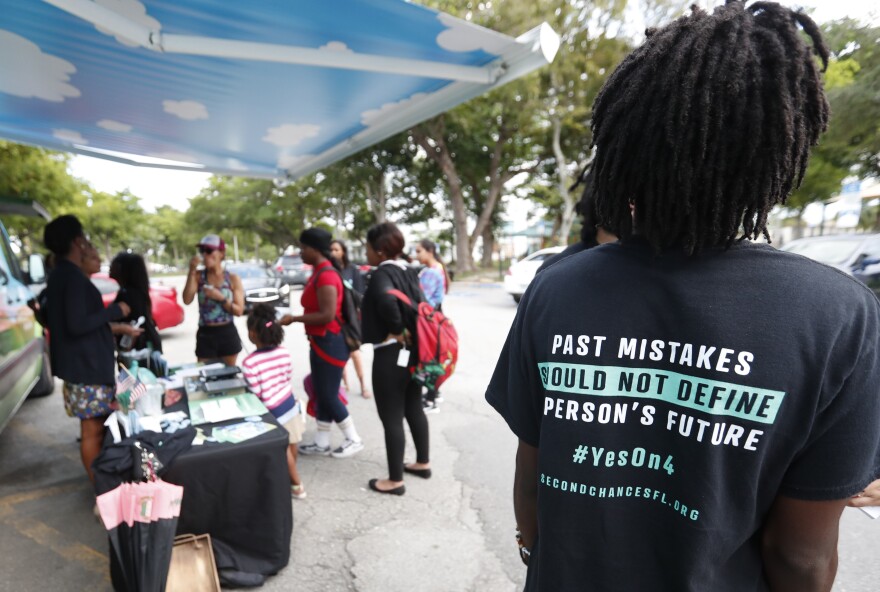When amendments are made to the constitution sometimes they need legislation to be passed that would implement the change. Well this year lawmakers are doing that with 2018’s Amendment 4 which allows certain felons the right to vote after completing their sentence. There’s debate over whether implementing legislation is needed and WFSU’s Blaise Gainey reports both sides clashed during Thursday’s bill hearing.
Tampa Republican Representative James Grant says when determining the voter’s intent of Amendment 4 he believes the legislature has only two options.
“Members it’s a binary choice. Either we choose to assume that voters relied on the testimony made in open court to the world. Either we choose to believe that voters could rely on the frequently asked question that clearly and unambiguously stipulated what the terms of a sentence meant or were going to pull the rug out from underneath them," said Grant.
What Grant is talking about is the Advisory Hearing held by the Florida Supreme Court. During this meeting Florida Rights Restoration Coalition attorney Jon Mills defined completion of sentence.
“It specifically includes all matters included in the sentence, including probation and parole. So that means all matters anything a judge puts in a sentence," said Mills.
"So, it would also include full payments of any fines," asked Florida Supreme Court Justice Ricky Polston.
"Yes, Sir,” Mills replied.
In response, Brian Pitts a common public commenter, says he agrees with Grant.
“They were trying to make it self- executing with language that was not set. The only way to do that from a ballot, is define the terms in the ballot. That’s what he did with the medical marijuana ballot, that’s why you’re locked into that. You’re not locked into this. So, I’m sorry. I very rarely agree but you’re going to have to go with Representative Grant on this,” said Pitts.
St. Petersburg Democratic Representative Wengay Newton agrees. But he also thinks the will of the voters should be what the legislature enacts.
“I heard Mr. Pitts, it was a glitch. And it’s up to us as a legislature to make sure we fix that and give the people the right and put forward the will of the voters," said Newton.
But what was the voter’s intent? And how do you find that out from more than 5 million people? Riverview Democratic Representative Adam Hattersly they’ve told him.
"Every constituent that I’ve spoken to share a similar sentiment. That they voted based on what was on the ballot not what was testified before the supreme court or on a website. It’s been said in committee that it’s not our purview to speculate as to what the will of the voter’s was. But I’ve yet to speak to a single voter that feels it was their intent to require returning citizens to pay fines and fees that were not assigned by a judge as part of their sentence," said Hattersly.
The fees and fines Hattersly speaks of are the medical cost and transportation cost. These aren’t on the sentencing document when the judge sentences you but are added on later by the Department of Corrections.
Hattersly says making felons pay back these fines before they can vote creates a caste system.
“There’d be a minority of well-off individuals who would be able to repay their fines quickly and regain their right to vote. Then there would be indigent citizens who already face great challenges reintegrating into civilian life," said Hattersly.
Hattersly is talking about people like Erica Racz a felon who thought she was going to get her right to vote back. She says she won’t ever be able to now.
"Now the fact that I may have a right to vote now, is going to be taken away because I cannot afford $57,000 being a single mother, being a convicted felon where I cannot go to school without paying out of pocket. I cannot use the degree that I earned before I went to prison," said Racz.
"I can’t even pay those student loans back. You want me to pay the government $57,000 to vote, I have no control over my daughters’ future, I have no control over her health care, I have no control over her education, I would love to have some control over her future. Money should not make me a person, my felony should not stop me from my future, from my child’s future, from any of this."
Bill sponsor Representative Grant says he believes the system is not a great one but that the bill and amendment does not ask for that.
"This isn’t a conversation about what we want, or what we feel, or what we like, or what we think is best. That’s what a deliberative body does in the policy process. That’s what the committee process is designed to do to flush out the work product and say Hey there’s something unintended here. But members that’s not what this is," said Grant.
Grant says although he is doing what’s right he does feel bad about one thing.
"Who I feel the worst for in this exercise is the people who volunteered. The people who went and got petition signed. The people who were told that if this passes you’ll have your voting rights back. See, they weren't told that Barbara Pariente in open court suggested that it would be a good thing for the state if there was an incentive to buy your voting rights back," said Grant.
The bill now heads to the House Judiciary committee. The Senate version is scheduled to be heard by the Senate Judiciary committee next Monday.





